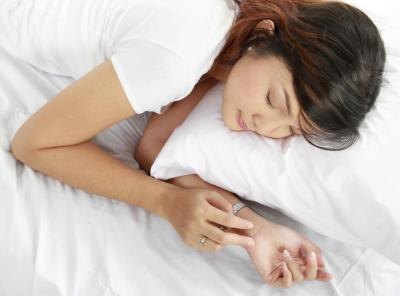
Receiving adequate sleep each night is an absolute necessity for physical and emotional health. In particular, growing teenagers need even more sleep than many people and they are particularly susceptible to the detriments of sleep deprivation. If your teen does not get enough sleep every night, she may suffer from improper body fat regulation, impaired cognitive function and hindered athletic performance.
Teenage Sleep Needs
While adequate sleep is certainly a necessity for those of all ages, teenagers have particularly high sleep requirements. One reason for this is that teenagers are growing, and it is during sleep that testosterone and other growth-promoting hormones are produced. Another reason is that teenagers on average are more physically active than any other demographic, and thus must sleep more. Unfortunately, according to the National Sleep Foundation, less than 15 percent of teenagers get at least 8 1/2 hours of sleep each night, while the recommended amount is 9 1/2 hours.
Regulating Body Fat
One reason that sleep is so important is that it has a profound effect on body fat regulation. During sleep, important appetite-regulating hormones such as leptin are produced, and these hormones can become deficient when sleep is inadequate. Consequently, this causes people who do not get enough sleep at night to overeat and thus gain fat. In fact, research in the “American Journal of Clinical Nutrition” in 2010 found that subjects who were forced to endure sleep deprivation ate an extra 560 calories more than they normally would, which is enough to result in more than 50 lbs. of weight gain over the course of the year if not matched with increased physical activity.
Reduced Cognitive Function
Another detriment that sleep deprivation can induce is significant impairment in cognitive function. Adequate sleep is necessary to enjoy optimal mental acuity, and a study in the “Journal of Sleep Research and Sleep Medicine” in 1998 found that teenagers who were deprived of sleep at night performed significantly worse on tests of cognitive function. Because teenagers are often expected to form at their best mentally during school, preventing sleep deprivation can have a profound effect on one’s performance in class.
Physical Consequences
A problem that can result from a lack of sleep is impaired athletic performance. According to research presented at the Annual Meeting of the Associated Professional Sleep Societies in 2008, increasing the amount of sleep received each night has been shown to significantly improve athletes’ abilities to perform. Because so many teenagers compete in sports, those who wish to perform their best should ensure they get adequate sleep. Teens may also experience clumsiness and slower physical reflexes, which could have a negative effect on driving safety.
www.livestrong.com





No comments:
Post a Comment